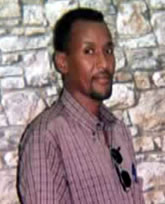
By Thomas Walkom
Thursday, November 29, 2007
That Stephen Harper's government takes a selective approach to human rights is well established. The Prime Minister has been vocal in support of Huseyin Celil, a Chinese-Canadian imprisoned in China after a questionable trial that convicted him of terrorism. Yet he remains strangely quiet when other governments with dodgy human rights records mistreat Canadians.
I won't even bother getting into the case of former child soldier Omar Khadr whose forthcoming trial at Guantanamo Bay prison camp promises to be such a farce that even his American military lawyer calls it a kangaroo court. Here, Harper's silence is at least in line with a long, if dishonourable, Canadian tradition of toadying.
 |
| Bashir Makhtal |
But his failure to help Bashir Makhtal, a Canadian imprisoned without charge in Ethiopia is, on the face of it, baffling. As these things go, this one should be easy.
Makhtal, who fled Ethiopia's war-torn Ogaden region as a child, was on business in Somalia when the Ethiopian army invaded last year.
Like many ethnic Somalis from the Ogaden, he sympathizes with the aims of the secessionist Ogaden National Liberation Front. Indeed his grandfather was one of its founders. While Canada does not consider the ONLF terrorist, Ethiopia does. So for him, the U.S.-backed invasion was not good news.
Taking Ottawa's advice, he fled to neighbouring Kenya. But Kenyan authorities seized his Canadian passport and handed him over to Ethiopia, which plunked him in jail without charge.
There, he's been subjected to standard police state procedures – solitary confinement, threats of torture, a coerced televised confession. For months, the Ethiopians refused to admit they held Makhtal. They still won't let Canadian officials see him.
By all normal standards of international law, Makhtal's human rights are being abused (which is why his Canadian lawyers are trying to sue Ethiopia). But an uncensored letter he managed to get home to his family last June does not mention physical torture. Indeed, the fact that he was able to get such a letter out suggests the Ethiopians do not consider him much of a terrorist threat.
That letter shows Makhtal in a feisty mood – critical of his treatment, fearful, yet confident (some might say naively confident) that Canada will come to his rescue. He writes that his jailers, while cheered by the example of George W. Bush ("America puts this type of people in Guantanamo," he quotes the prison head as saying), are still worried about criticism from western donors.
Ethiopia is the second largest recipient of Canadian official development assistance – $108 million in 2005.
Makhtal writes that the small amount of Canadian attention he has received so far has dissuaded the Ethiopians from doing worse to him. And he pleads with Ottawa to do everything in its power to ensure that, at the very least, he is brought before a civilian court.
"My only hope and possible chance is the Canadian government," he writes.
How unfortunate then, that it is this government he depends on. Former foreign minister Peter MacKay raised Makhtal's case once with the Ethiopians. The current minister, Maxime Bernier, has done nothing.
When Makhtal's cousin Said Maktal wrote Harper to plead for help, he was answered with a form letter.
"The Prime Minister appreciates your interest and has asked me to thank you," reads the reply from Harper's correspondence unit. "Thank you for taking the time to write."
Thomas Walkom's column appears Thursday and Sunday.